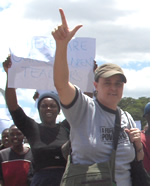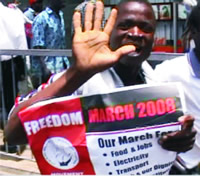What’s in Gwanda?
Tuesday, March 4th, 2008 by Amanda AtwoodI’ve been trying to make a bit of sense of the candidate lists for this upcoming “harmonised” Presidential, House of Assembly, Senate and local government election on March 29th. With 210 House of Assembly constituencies and 60 Senate seats up for grabs, there’s a lot of names to get one’s head around.
The official list of nominees has been published in a government gazette, but it doesn’t necessarily make much sense. In some constituencies, there are multiple candidates nominated for the same party. In other constituencies, it’s not clear which is the MDC (Tsvangirai) candidate, and which is the MDC (Mutambara) candidate. In a few places, both MDC’s have fielded candidates whom I would have considered to be quite senior, or popular, in the same place – surely this might lead to vote splitting? In other places, Zanu PF is dealing with its own issues of internal discipline. A handful of Zanu PF candidates in Masvingo, for example, have been instructed to withdraw, because the party has decided that someone else should be the candidate there. The Herald has yet to publish the complete list of nominees because, it claims, the Zimbabwe Electoral Commission hasn’t released it yet. This, some suspect, is because Zanu PF is still busy trying to get some people to back down so that others can stand as the single Zanu PF candidate in a given constituency. When I phoned the ZEC to ask for the list, they said I could ask them to tell me who the candidates are in my constituency – but they wouldn’t give me the list for the whole country. What is this? A democratic election? Or a state secret?
Fortunately, there are a few moments of light relief. Like the fact that one of the candidates in Gokwe-Chireya is named Chemist. Whilst a candidate in Gokwe-Sengwa is named Cowboy. It takes all kinds.
And, curiously enough, barring the instances where there is more than one candidate listed for a given party, one constituency stands head and shoulders above the rest in terms of the most hotly contested. I asked my colleague yesterday – what constituency do you think has the most candidates? Where is it that most people want to be the MP for? Harare Central, she guessed. The seat of business and government, culture and sport. Nope. Gwanda Central. Six people are vying for the privilege of representing Gwanda in the House of Assembly. “What’s in Gwanda?” my colleague asked when I told her this. Indeed.











